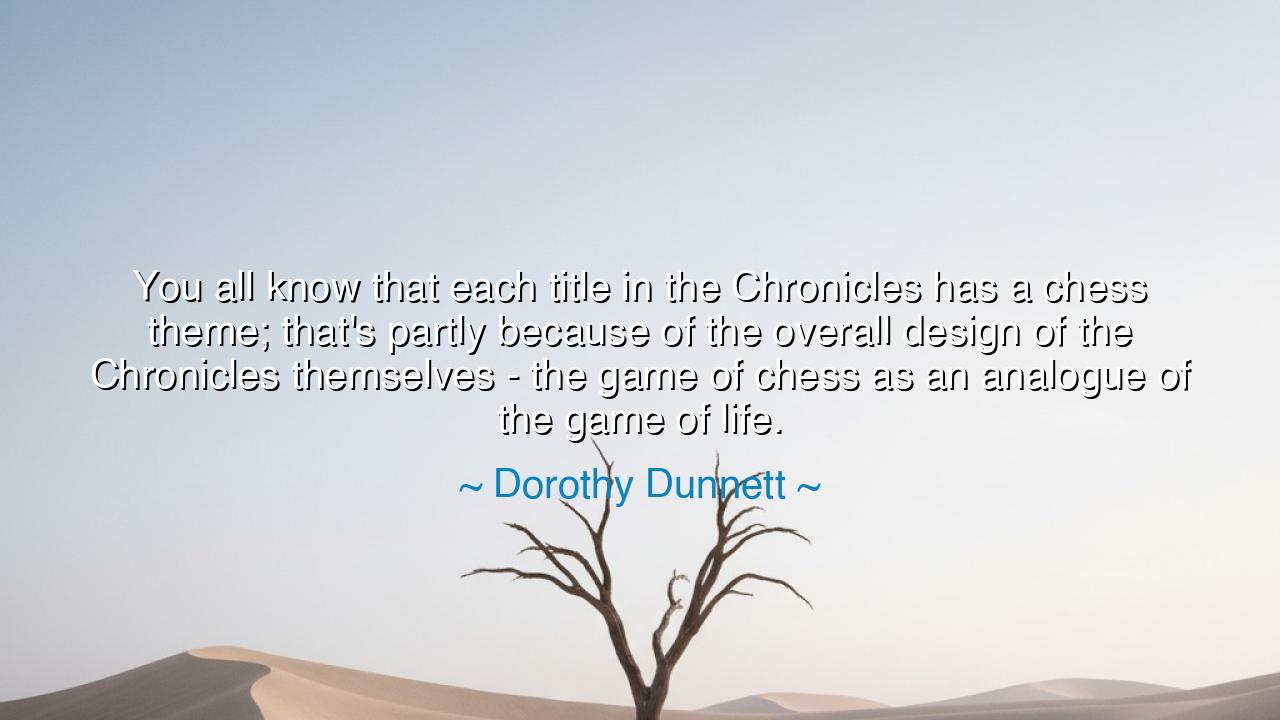
You all know that each title in the Chronicles has a chess theme;
You all know that each title in the Chronicles has a chess theme; that's partly because of the overall design of the Chronicles themselves - the game of chess as an analogue of the game of life.






The words of Dorothy Dunnett — “You all know that each title in the Chronicles has a chess theme; that's partly because of the overall design of the Chronicles themselves — the game of chess as an analogue of the game of life.” — are both poetic and profound. In them, the novelist unveils not merely her method as a storyteller, but a timeless truth about the nature of human existence. To Dunnett, life is not a random scattering of moments, but a strategic design, a vast and intricate chessboard upon which destiny, choice, and chance intertwine. Each move we make, each sacrifice and triumph, mirrors the silent, deliberate dance of chess — a game of foresight, balance, and courage.
To understand her meaning, one must first grasp the symbolism of chess. It is not simply a contest of intellect; it is a miniature cosmos, a battlefield of order against chaos. Every piece upon the board — the king, the queen, the knight, the pawn — represents an aspect of human nature and society. The powerful and the humble coexist, each bound by rules, yet each essential to the whole. Victory is not won through might alone, but through wisdom, patience, and the ability to see beyond the present move. So it is with life: we are all both players and pieces, moved by our own hands and by forces larger than ourselves.
Dorothy Dunnett’s Chronicles — her grand historical sagas — reflect this philosophy in every line. Her characters are not merely living through history; they are playing it, each choice setting off a chain of consequences that ripple through nations and generations. The heroes of her works, like Francis Crawford of Lymond, move through a world as dangerous and calculated as a chessboard, where love, loyalty, and ambition are pieces in constant peril. In crafting such tales, Dunnett reminds us that the design of life is both intricate and deliberate — that every triumph is paid for by sacrifice, every advancement shadowed by risk.
The ancients would have understood this metaphor well. To the philosophers of Greece and the sages of the East, life itself was a game between fate and will. The Stoics taught that the wise man must play his role well, no matter the hand he is dealt, for he cannot control the pieces given to him — only the skill with which he moves them. In India, the game of chaturanga, the ancestor of chess, was once a meditation on the art of governance, war, and duty. Kings learned through play that wisdom was greater than force, and that even a pawn, guided by patience, might one day stand beside the throne. Dunnett, in her wisdom, inherits this lineage, teaching through story that life is strategy wrapped in mystery, and that those who learn to think deeply may move more gracefully across its board.
But the metaphor of chess also carries a moral weight. For every move has consequence, and the careless hand can bring ruin not only to oneself but to others. How often in history have the proud and the reckless moved without foresight, only to be undone by their own haste? Consider Napoleon, master strategist of war, who once seemed the king of Europe. His brilliance dazzled the world — yet, blinded by ambition, he made one fatal move too many. His march into Russia was a gamble of arrogance, and it cost him his empire. In this, Dunnett’s analogy finds its echo: the game of life punishes those who mistake cleverness for wisdom, and rewards those who understand the value of restraint.
Still, chess is not a game of despair, but of endless renewal. For even in defeat, one learns; and in every game, the board resets, waiting for the next attempt. Dunnett’s insight into the “overall design” of her Chronicles reveals her faith in this pattern — that human life, for all its tragedy, carries a deep order beneath its seeming chaos. The fallen pawn becomes a lesson, the sacrificed queen a symbol of purpose. The wise learn that no loss is wasted, if one reads the design rightly. Thus, her words teach patience in struggle and humility in success, for life, like chess, demands that one play long and see far.
So, my child, remember this teaching of Dorothy Dunnett, who saw in the ancient game a reflection of eternity. In your own life, play with intention. Move not in anger, but with foresight. When faced with loss, do not despair — for even the smallest piece can rise again through courage and wisdom. And when victory comes, do not boast, for the board will soon reset, and the game will begin anew. For such is the analogue of life: a sacred pattern of conflict and creation, a design that invites not mastery, but understanding. Those who grasp this truth will live not as pawns of fate, but as players in harmony with the grand design of the universe.






AAdministratorAdministrator
Welcome, honored guests. Please leave a comment, we will respond soon